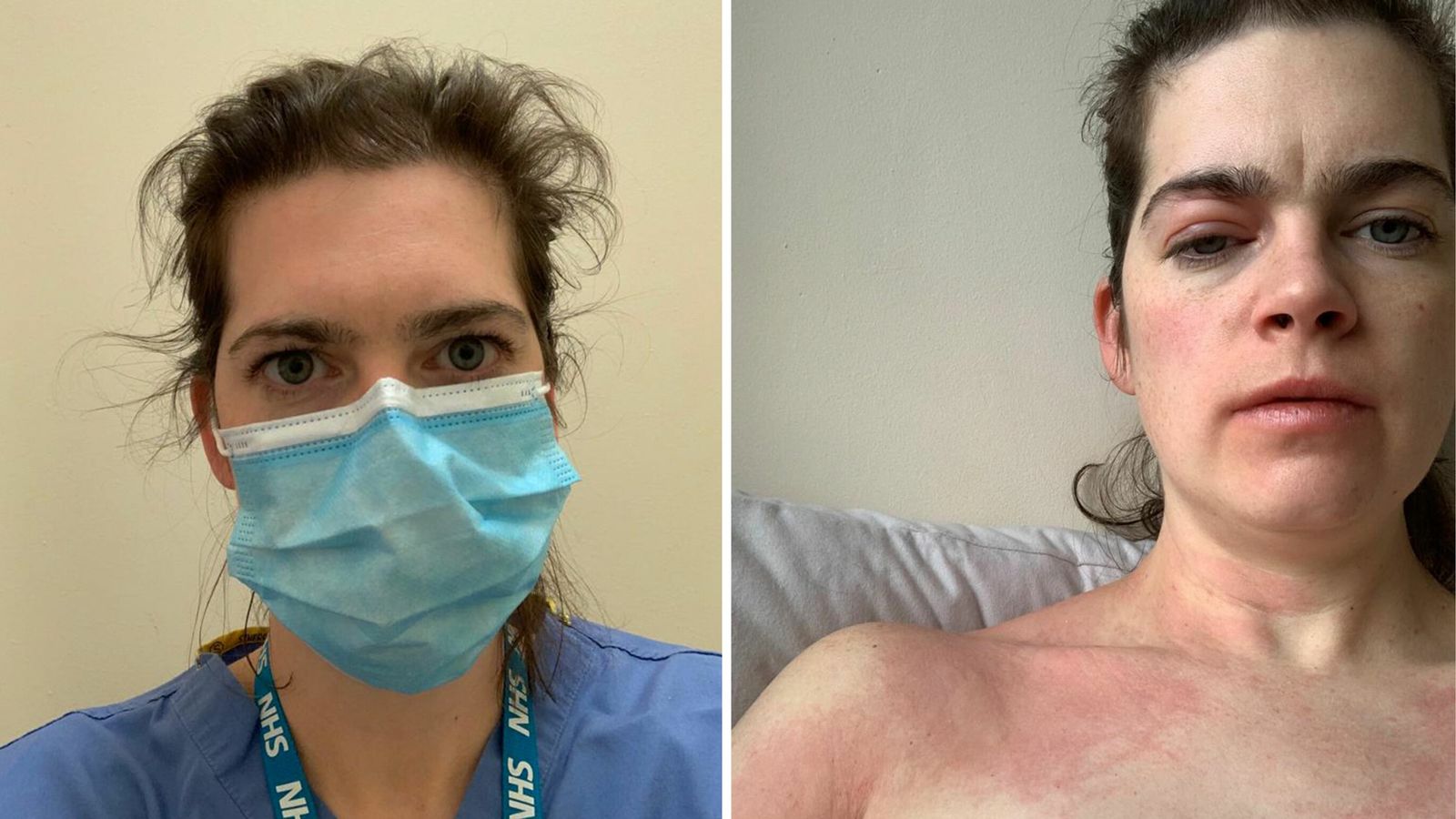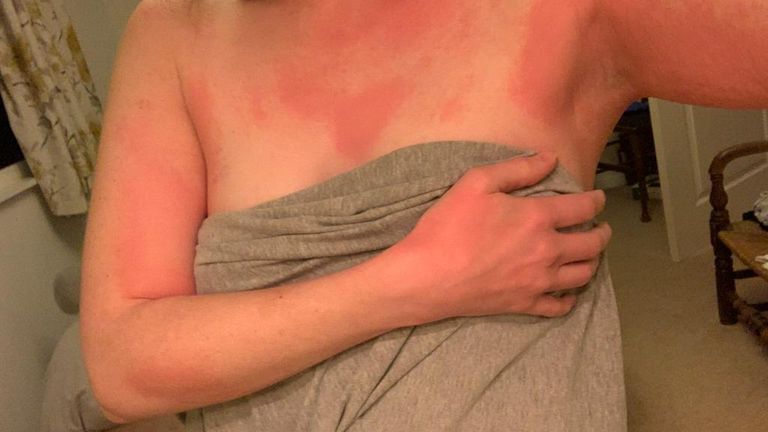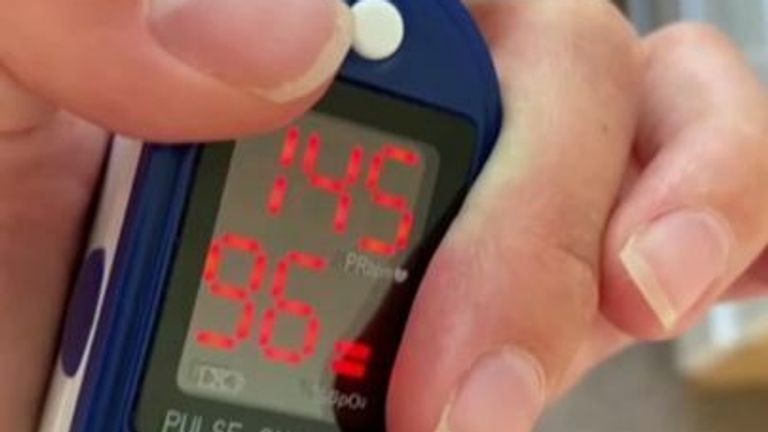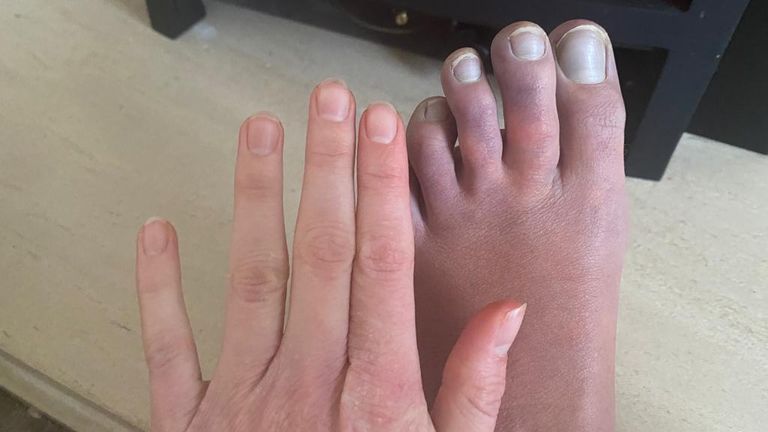Hundreds of doctors are planning to sue the NHS over claims inadequate PPE on the frontline has left them with long COVID, disabled, and in financial ruin.
Dr Kelly Fearnley, 37, was working on a COVID ward at Bradford Royal Infirmary in November 2020 when she caught coronavirus.
More than three years later, the effects of long COVID mean she is still unable to work. After episodes of violent shakes, hallucinations, and a resting heart rate more than double the average, she was diagnosed with limbic encephalitis – inflammation of parts of the brain.
An infectious diseases registrar who treated people with the Ebola virus, she says COVID has left her with spinal damage after her concerns about a lack of PPE during the pandemic were ignored.
A British Medical Association study of 600 doctors with long COVID last year revealed that 60% had suffered persistent ill health since contracting COVID, and around half (48%) had lost earnings.
Dr Fearnley co-founded Long COVID Doctors for Action (LCD4A), which is today pledging legal action against the NHS for negligent workplace exposure to coronavirus, resulting in injury and financial loss.
The group, which is being represented by the legal firm Bond Turner, claims the NHS decided to downgrade guidance as the virus took hold in March 2020, only requiring staff to wear blue surgical face masks, plastic aprons, and gloves when dealing with suspected or confirmed COVID cases.
This is in line with World Health Organisation (WHO) guidance, which says there is only strong evidence for more restrictive masks such as FFP3s, FFP2s, and N95s, being worn for “aerosol-generating procedures” – not general care of COVID patients.
But both the US and European public health authorities advise at least FFP3 or N95 masks for any healthcare worker in a COVID environment, with scientists leaning on both sides.
Dr Simon Clarke, associate professor in cellular microbiology at Reading University, told Sky News there is a “greater than 50% chance” healthcare workers who were infected in early 2020 contracted the virus at work, as lockdown meant other contact was significantly reduced – but there are no guarantees.
He added: “Some masks seem to be more effective than others and can vary quite a lot.
“We have to remember that there was a shortage nationally of PPE. So the supplies of better, more effective masks might have been somewhat restricted.”
The public inquiry into the UK’s handling of the pandemic has heard PPE provision for healthcare workers was “hopelessly inadequate”. Government and public health officials have admitted “mistakes were made”.
Read more:
One in five doctors with long COVID forced to reduce hours
NHS face legal action over schoolgirl’s long COVID treatment
How long COVID ruined my life
Dr Fearnley, who is currently on 12 months’ unpaid leave, having not worked since the end of 2020, says she used higher-grade masks from when she started work as a junior doctor in the spring until she was deployed to a COVID ward in November.
She said: “I walked onto the COVID ward and there was just a small box with blue masks.
“I asked where the other masks were and was told ‘we’re using these now, don’t worry they’ll protect you’.
“The sudden downgrading of PPE was not based on the known science.
“I didn’t have time to think about it. But I spent 12 hours a day, for five consecutive days, surrounded by COVID-positive patients in the absence of adequate respiratory protection.”
‘My brain is still infected’
Dr Fearnley says she tested positive for COVID after one week on the ward. For four weeks she had flu-like symptoms and suffered breathlessness, as well as a swelling around her eye and a red rash across her body.
She tried to return to work after three weeks but only lasted two hours before dizziness and breathlessness forced her to go back home.
“It was like a switch flipped in my body,” she said.
Her long COVID symptoms over the next two years left her largely bedbound and, at times, suicidal.
“I started to turn more of a corner after two-and-a-half years. Now I can get dressed and move around the house. I can exert myself cognitively and physically a little bit more.
“But I still deal with symptoms daily, my brain still feels infected and there’s an ongoing pathological process in my body I believe needs treatment before I can recover. I feel like I have sustained a traumatic brain injury.
“At 37 I’m living and relying on my 70-year-old father for support. If it wasn’t for him I’d be homeless.”
Call for other doctors to join legal action
LCD4A is calling for other doctors and healthcare workers who worked in England and Wales and suffered similar circumstances to join its group legal action.
Hundreds have signed up, many say they have lost their jobs, and had relationships end. Several of those still employed by the NHS claim they have reached maximum sick pay or are struggling to claim benefits.
One consultant, who asked to remain anonymous, but whose income protection and life insurance were denied, said: “I was once at the peak of my career and have had to give up all my dreams and become a shell of my former self.
“There is no hope at present and at times I wish I died during COVID.”
One junior doctor said her long COVID complications mean she feels unable to ever have children – or become a consultant.
The 33-year-old described how brain fog and mobility problems cause her to burn herself on hot cups of tea, having failed to “work out how to hold them safely”.
GP members have reported losing their practices and years on from their original infection one still described going to the toilet as feeling “like climbing Mount Everest”.
Ebola expert warned London hospital about masks
Dr Nathalie MacDermott is another LCD4A member who moved from her job as a clinical lecturer in paediatric infectious diseases at King’s College London to work on the COVID frontline in March 2020.
The 41-year-old was moved to Great Ormond Street Hospital and worked as a paediatric registrar.
She caught COVID at the end of March and was off work with classic symptoms for 10 days. When she returned in early April, she says she was moved to a different ward, which was largely caring for children with multi-system inflammatory syndrome – a potentially fatal response to COVID seen in children that causes inflammation of various organs.
Having worked on Ebola and cholera in Africa and Asia, with her background in infectious diseases, she was alarmed by the lack of PPE – and raised it with senior managers.
“I spoke to the head of infection control and said it was unacceptable. I said we should at least have FFP masks but I was told we didn’t need them.”
She claims when she told her staff to wear higher-grade PPE, people would “come to the wards and tell them off for wearing PPE they shouldn’t be wearing”.
Dr MacDermott believes that those responsible for infection control policy across NHS England are to blame for what she, Dr Fearnley, and hundreds of others have suffered as a result of long COVID.
“At the end of the day, people made decisions and those decisions had consequences, and those people are not taking responsibility for those decisions.
“When I worked on Ebola in Liberia, I told healthcare workers that I would never ask them to go into an environment wearing PPE that I wouldn’t go into wearing that PPE myself.
“The NHS sold out their staff during the pandemic. And I’m not going to stay quiet about it because we haven’t learned and we’re still doing it.
“If we had another pandemic tomorrow, we would make exactly the same mistakes again.”
COVID caused spinal cord damage
Dr MacDermott says she caught COVID again and developed severe pain in her neck, back, arms, and soles of her feet.
She continued to be off work and by September 2020 her legs had become “jerky” and her “mobility took a turn for the worse”.
Long COVID has also affected her bladder and bowels, and she now uses a mobility scooter as she is unable to walk without crutches for more than around 100m (330ft).
“The overall conclusion is that I have something called a COVID-related myelopathy, which means COVID has damaged my spine, but we don’t know exactly what that damage is and how it’s done it.”
Dr MacDermott returned to work after almost two years in March 2022. She has had COVID twice since, which she says has set back her neurological symptoms each time.
Her research funding comes to an end in six months and she has so far been unsuccessful in getting further grants. Her health means she can’t do a full-time clinical role.
“So even though I’ve finally got to the end of my training, having graduated from medical school in 2006, I now can’t be the paediatric infectious diseases consultant I wanted to be.”
Both she and Dr Fearnley say they do not feel safe returning to work in the NHS with its current infection control policy, which is still the same.
Dr Fearnley added: “Coronavirus is unequivocally airborne and warrants respiratory protection.
“Our employers have a legal duty of care. Workers have a right to be protected at work and patients have a right to be cared for in safe environments. Hospitals are failing in their duty of care.”
Legal challenge of proving negligence
Legal commentator Joshua Rozenberg says all claimants face a considerable legal challenge in proving the NHS was negligent at that time.
“They have to show that their employers, the hospitals they were working in, didn’t meet what were then-accepted standards of care.
“Presumably when people didn’t really understand COVID, didn’t know about long COVID, perhaps didn’t know what level of protection was necessary for professionals working in the health service.”
He added that the doctors need to clarify which NHS or government bodies they are going to sue.
“They’ve got to decide who was actually responsible and whether they were negligent or not.”
Sara Stranger, director and head of clinical negligence and serious injury claims at Bond Turner, said: “As the nation stood at their doors clapping, our frontline NHS workers risked their lives while caring for patients, without proper protection.
“Thousands contracted the virus themselves, and many have since developed long COVID.
“We are committed to seeking justice for those who were exposed to an unnecessary risk of infection while working on the front line.”
A Department of Health and Social Care spokesperson told Sky News: “Throughout the pandemic the government acted to save lives and livelihoods, prevent the NHS being overwhelmed and deliver a world-leading vaccine rollout which protected millions of lives across the nation.
“We have always said there are lessons to be learnt from the pandemic and we are committed to learning from the COVID-19 inquiry’s findings, which will play a key role in informing the government’s planning and preparations for the future. We will consider all recommendations made to the department in full.”
Sky News has contacted NHS England and the UK Health Security Agency for further comment.






